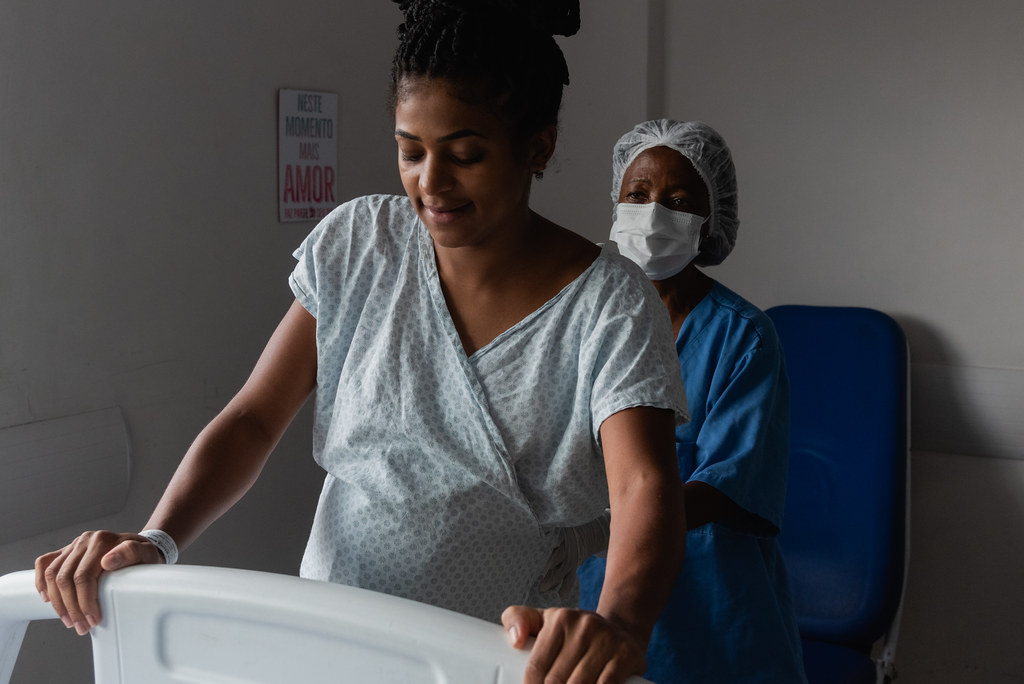DePauw’s Professor Angela Castañeda, PhD and Vivienne Edwards ‘24 worked jointly on a project, researching obstetric violence and doula care in Indiana. They especially focused on Black doulas and the kind of medical racism they face in their line of work, gathering material through personal interviews, observations, and collaborative research. The focal premise of the project was to question whether doulas are the solution to the high maternal mortality rates in the US, with Indiana unfortunately among the top states on the scale.
An infographic made by Edwards compared maternal mortality ratios of various countries, and the US significantly surpasses places like the UK, Canada, France and more. In Indiana, in particular, there are 108 deaths per 100,000 live births for white parents, and 208 deaths for Black parents. Despite their lack of professional medical experience, the presence of a doula has been shown to reduce anxiety and stress for the birthing person, lower the need for C-sections, reduce the length of labor and prevent premature birth. A doula can be defined as a woman, typically without formal obstetric training, who is employed to provide guidance and support to a pregnant person during, and often even after labor. They offer physical, emotional and informational support, as well as incorporate soft strategic advocacy for the family in the face of medical racism, obstetric violence and rape, and bias from doctors.
Research from the “Maternity Mortality Programs Director of Division of Fatality Review and Prevention” shows that 87% of fatalities are preventable, but still happen due to neglect and racism. One heartbreaking incident was that of a Black doctor who passed away postpartum during the pandemic because nobody believed her when she expressed concerns about her health. A long history of racism in the US has also instilled the dehumanizing notion that African American people don’t feel, or feel less pain than usual, which causes the dismissal of their very real pain and a lack of administration of relieving medication. The medical professionals who don’t hear and believe Black women have built up self doubt and invalidation in them, which can pose even more life-threatening situations. One doula stated in an interview, “In the US there is an afterlife of slavery,” which is reflected in the great extent to which American hospitals are tied to the institution of slavery. For example, in the 1840s in Alabama, several enslaved black women were experimented on without anesthesia, despite the severe pain the procedures cause them.
Additionally, obstetric violence is noted to have increased during the pandemic, and the parameters for social distancing and isolation brought the significance of doulas in the birthing room into question. One solution implemented during these times was a virtual doula, but they too were disrespected and disregarded by doctors and nurses that were physically present. There were instances when doctors shut laptops and screens without permission of the doula or parents in the birthing room. Doulas faced a great deal of backlash and negativity during the pandemic, when their strategic advocacy and support would have been the most crucial.
This brings us back to the central question of whether doulas are, in fact, the solution to medical racism and obstetric violence. From a doula’s perspective, “Doulas are a big chunk of the solution but policy change is also a big chunk of the solution. Identifying systemic racism and changing the policies or medical practices, and how doctors perceive systemic racism…” Another doula placed emphasis on the medical professionals’ responsibility to work in tandem with doulas and present a united front to the benefit of the birthing person and family. Edwards and Dr. Castañeda really connected with the doulas they contacted and interviewed, and clearly feel strongly about this imperative and easily overlooked issue in the medical sphere. Post-presentation, the floor was opened for discussion and questions, answered thoughtfully by both of them.
All in all, it is important to be conscious of different branches of systemic racism and violence that are as old as colonial America, and recognize the responsibility of those in power to enact lasting social change.

